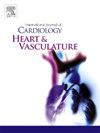TAVI 与 SAVR 患者的术后谵妄--系统回顾与荟萃分析
IF 2.5
Q2 CARDIAC & CARDIOVASCULAR SYSTEMS
引用次数: 0
摘要
背景导管主动脉瓣植入术(TAVI)和外科主动脉瓣置换术(SAVR)的创伤程度不同,会导致术后功能状态的不同。主要终点是 TAVI 或 SAVR 术后谵妄(POD)的发生率,采用意识模糊评估法(CAM)进行评估。次要终点包括30天死亡率、中风、大出血和住院时间(LOS)。结果我们共鉴定了1,161篇手稿,对其中10项研究(12,015名患者)进行了分析。与 SAVR 患者相比,TAVI 患者的 POD 发生率明显较低(OR:0.35,95 % CI,0.26-0.48,p < 0.01)。结论与SAVR相比,TAVI术后谵妄发生率较低,且不影响住院时间或其他主要临床结果。要了解术后谵妄对短期和长期预后的影响,还需要进一步的研究。本文章由计算机程序翻译,如有差异,请以英文原文为准。
Postoperative delirium in patients undergoing TAVI versus SAVR – A systematic review and meta-analysis
Background
Transcatheter Aortic Valve Implantation (TAVI) and Surgical Aortic Valve Replacement (SAVR) have different levels of invasiveness which can result in different levels of functional status after the procedure.
Methods
We performed a systematic review and meta-analysis to detect studies showing direct comparison between TAVI and SAVR regarding postoperative functional status. The primary endpoint was the incidence of postoperative delirium (POD) after TAVI or SAVR, assessed using the Confusion Assessment Method (CAM). Secondary endpoints included 30-day mortality, stroke, major bleeding, and hospital length of stay (LOS).
Results
We identified 1,161 manuscripts, of which 10 studies (12,015 patients) were analyzed. TAVI patients had a significantly lower incidence of POD (OR: 0.35, 95 % CI, 0.26–0.48, p < 0.01) compared to SAVR patients. No significant differences were found in secondary outcomes between the groups.
Conclusions
TAVI is associated with a lower incidence of postoperative delirium compared to SAVR without compromising length of stay or other major clinical outcomes. Further research is needed to understand the impact of postoperative delirium on short and long-term outcomes.
求助全文
通过发布文献求助,成功后即可免费获取论文全文。
去求助
来源期刊

IJC Heart and Vasculature
Medicine-Cardiology and Cardiovascular Medicine
CiteScore
4.90
自引率
10.30%
发文量
216
审稿时长
56 days
期刊介绍:
IJC Heart & Vasculature is an online-only, open-access journal dedicated to publishing original articles and reviews (also Editorials and Letters to the Editor) which report on structural and functional cardiovascular pathology, with an emphasis on imaging and disease pathophysiology. Articles must be authentic, educational, clinically relevant, and original in their content and scientific approach. IJC Heart & Vasculature requires the highest standards of scientific integrity in order to promote reliable, reproducible and verifiable research findings. All authors are advised to consult the Principles of Ethical Publishing in the International Journal of Cardiology before submitting a manuscript. Submission of a manuscript to this journal gives the publisher the right to publish that paper if it is accepted. Manuscripts may be edited to improve clarity and expression.
 求助内容:
求助内容: 应助结果提醒方式:
应助结果提醒方式:


